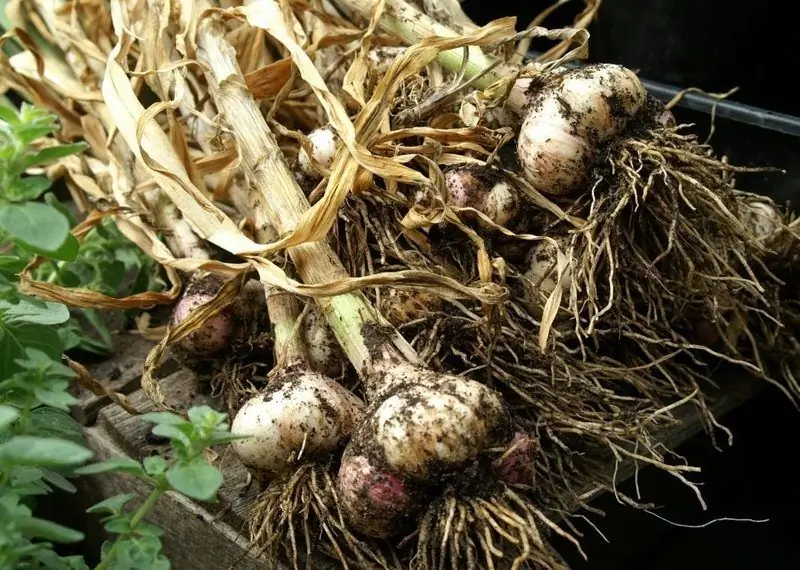
Table of contents:
- Author Bailey Albertson albertson@usefultipsdiy.com.
- Public 2023-12-17 12:53.
- Last modified 2025-01-23 12:41.
What can be planted after and next to garlic and onions
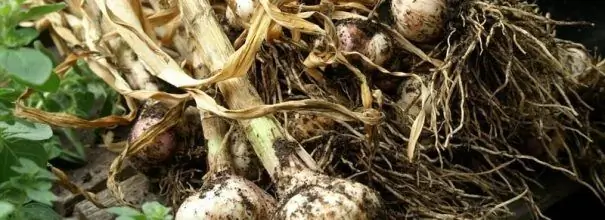
Not only onions from seven ailments, and garlic has no less healing properties. Therefore, they are planted by almost every gardener. And these vegetables heal not only a person, but also the soil where they grow. This means that there are no big problems with what to plant after them or next to them, but there are still some restrictions.
Content
- 1 What can be planted after garlic and onions for the next year
- 2 What not to plant
- 3 What can be planted with garlic and onions in one bed: mixed plantings
- 4 Reviews
What can you plant after garlic and onions for the next year
There are very simple and clear rules of crop rotation, which are compiled both on the basis of the rich experience of gardeners and using scientific data. They take into account the fact that vegetables belonging to the same family are affected by the same diseases and pests, and therefore cannot take place in the garden one after another, so as not to pick up an ailment from a predecessor, because pathogens and pests, as a rule, overwinter in the soil.
In addition, it is known that some crops take out a huge amount of nutrients from the soil, while others are content with little. At the same time, food preferences can be different (some focus on nitrogen, others on potassium, the situation with trace elements is even more difficult). This fact must also be taken into account. In part, the problem is solved by alternating crops whose roots penetrate deeply and those in which they are on the surface.
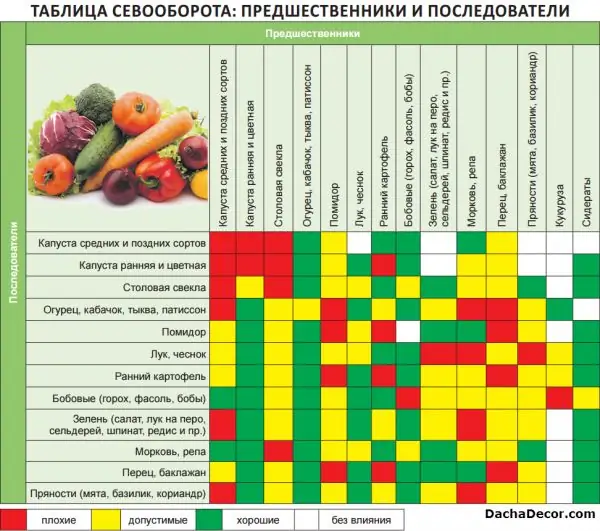
There are many crop rotation reference tables
It is customary to return almost any culture to its original place not earlier than after 3-4 years, and some even later. Ideally, once every 5-6 years, the land should be left without planting at all. A very good way to restore the soil is the autumn sowing of siderates - grasses that are mowed and buried in the ground after they grow back. These are clover, oats, lupine, etc.
In addition, when choosing the next crop, one must not forget about the general conditions that are required for its cultivation: the composition and acidity of the soil, illumination, etc. In this regard, onions and garlic do not present problems: they are grown in the light, on light fertile soils, their roots are at an average depth, and these crops themselves disinfect the soil well. This is used to plant strawberries in their place: after all, they are settled at once for several years. It should be remembered that onions and garlic consume a lot of potassium and much less phosphorus.
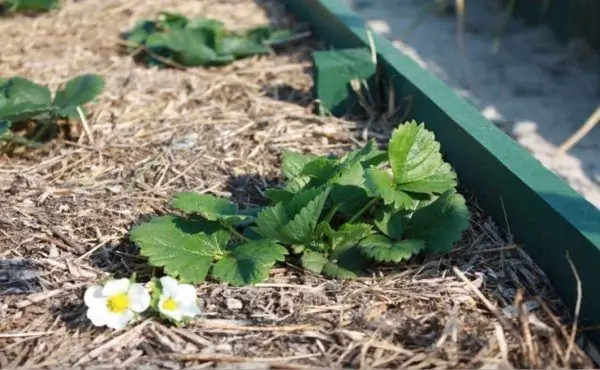
Strawberries can be planted not next year, but immediately after harvesting the garlic
In addition to strawberries, after onion crops, they feel great in the garden:
- all varieties of cabbage (white cabbage, cauliflower, savoy cabbage, etc.);
- any cruciferous (radish, daikon, radish, etc.);
- pumpkin crops (zucchini, pumpkins, cucumbers);
- nightshade vegetables (eggplants, peppers, tomatoes, potatoes);
- legumes (peas, lentils, beans);
- beet.
Carrots are a wonderful neighbor of onions, but after it they try not to plant them, although they cannot find a clear explanation for this.
As far as garlic is concerned, there is another peculiarity that concerns onions to a lesser extent. Winter garlic is harvested in the middle of summer (onions - a month later), so already this year you can have time to grow something on a garlic bed. Early ripening green cultures are very good in this regard: dill, coriander, various salads. However, in August, you can plant radishes: in the conditions of decreasing daylight hours, it almost does not shoot.
What not to plant
After garlic and onions, there are practically no pathogens left in the soil, but there is a great risk of infection with nematodes, even if the vegetables themselves did not have time to be affected by them. Therefore, after onions and garlic, you can not plant anything from onion crops: any types of onions and garlic itself. Bulbous flowers (tulips, daffodils, hazel grouses, etc.) should not be planted either. Most crop rotation tables do not recommend planting any spices (mint, basil, etc.) after onions, believing that their aroma will deteriorate somewhat.
However, considerable experience in gardening allows us to assert that strictly after garlic and onions, only onion varieties can not be planted: neither leeks, nor chives, nor onion (rocambol), etc., while the rest of the vegetables are very grateful to these predecessors for the clean soil.
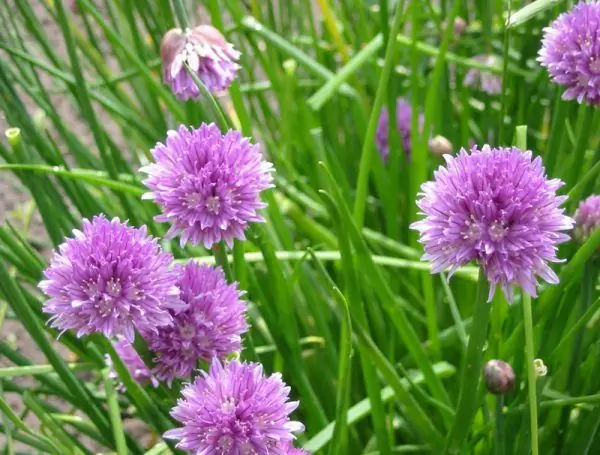
Even chives for decorating the garden should not be planted after onion crops.
What can be planted with garlic and onions in one bed: mixed plantings
Joint planting of vegetables in the garden is very beneficial, as it allows more rational use of the soil. Many birds are killed here. You can sow early ripening crops (for example, radishes) on a bed with a long-lived crop and have time to remove it before the main crop has filled the entire bed. You can take into account the different preferences of vegetables: let some waste nitrogen from the soil, and others potassium. Most importantly, there are unique crop combinations where they mutually help each other grow and fight pests. But there are also incompatible cultures that inhibit each other's growth.
The neighborhood with onions and garlic is favorable for most vegetables, but the classics are onions and carrots in the same garden: they, respectively, drive away carrot and onion flies. In addition, it is good to plant next to garlic and onions:
- strawberries, strawberries;
- tomatoes, peppers;
- beets;
- almost any flowers;
- potatoes;
- any greens.
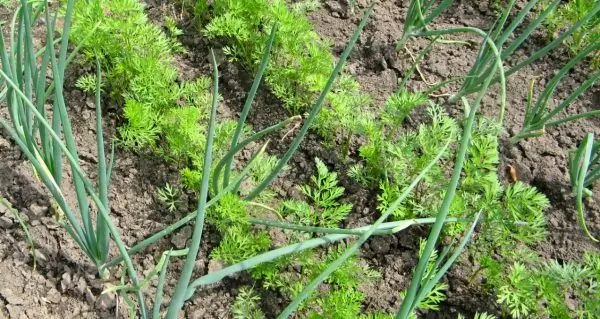
Onions and carrots are the best neighbors
Legumes (peas, beans, beans, lentils) and herbs (basil, cilantro, mint) are not planted with onion crops. The essential oils secreted by spices inhibit the growth of garlic and onion bulbs. As for cucumbers or cabbage, they would be great neighbors for onions and garlic, if not for the requirement for a huge amount of moisture. By watering cucumbers and cabbage, you can swamp the soil so much that garlic and onions will simply rot right in the garden. But the neighboring garden is the best fit for these vegetables.
Is it possible to plant garlic and onions in the same garden? Not. Nothing prevents you from planting them in neighboring beds, but when planted in a mix, they will compete for the same nutrients, which will lead to oppression of each other and a decline in yield.
Reviews
After onions and garlic, almost any vegetable can be grown except for their related bulbous crops. With joint plantings in the garden, the situation is somewhat more complicated, since here it is necessary to take into account, among other things, the need for vegetables in moisture.
Recommended:
What To Plant After Strawberries Next Year And What Not To
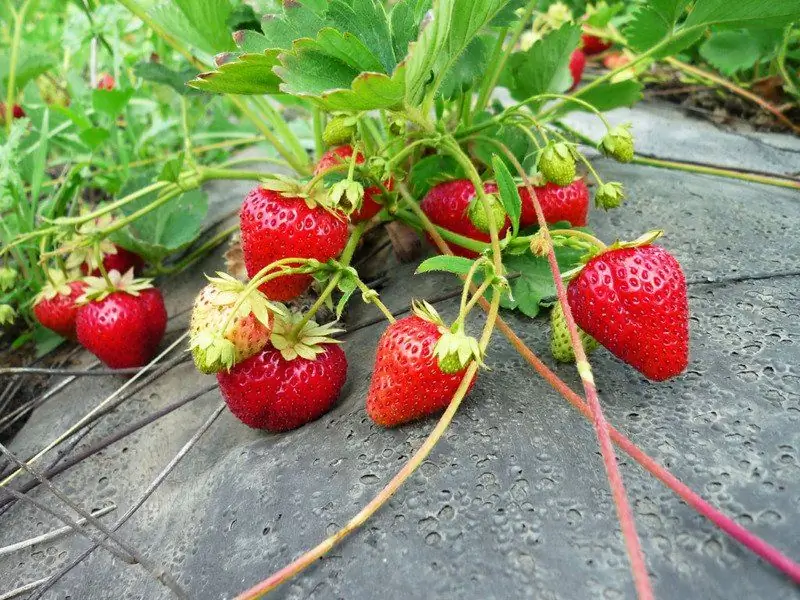
Strawberry crop rotation rates: which crops can be planted and which ones are better not to plant after strawberries
We Plant Onions Before Winter! When, What Kind And How To Plant Onions Before Winter?
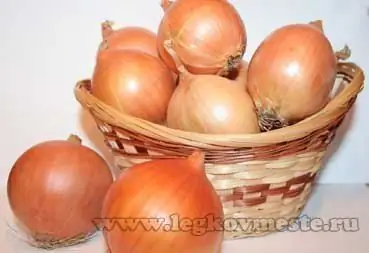
An article about when and how to plant onions before winter. How to properly plant onions before winter. The best varieties of onions for planting before winter
What To Plant After Potatoes For The Next Year And What To Combine Planting With
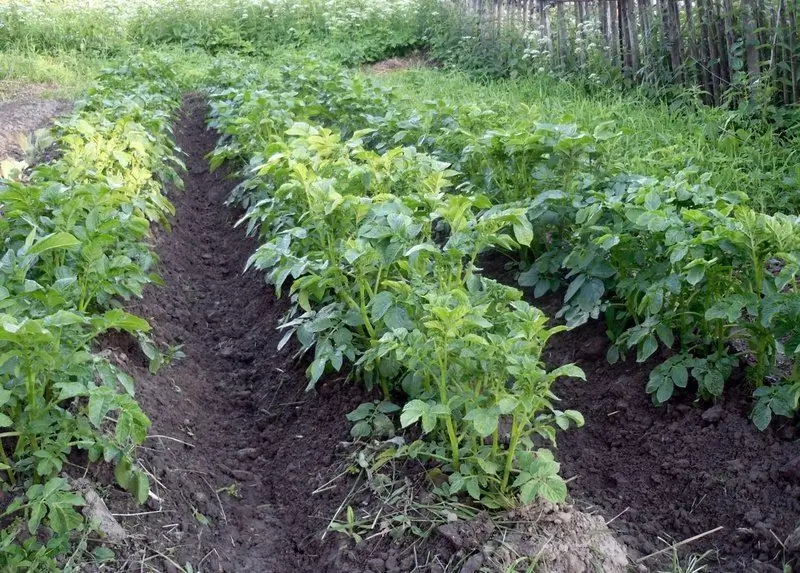
How crop rotation rules explain the presence of good and bad predecessors in the garden. What can and can not be planted after potatoes, as well as on the same bed with him
What To Plant After Cucumbers And Zucchini For The Next Year And What To Combine Planting With
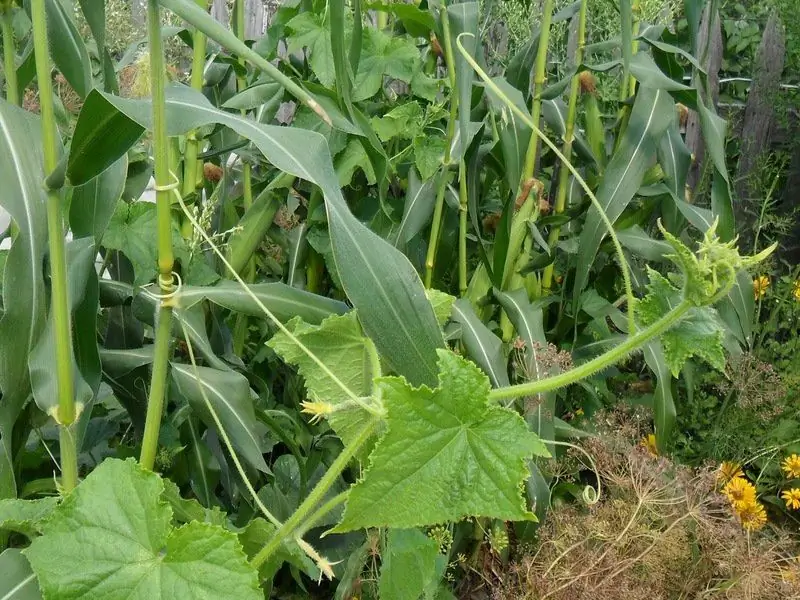
What can you plant after zucchini and cucumbers for the next year. What is the reason for the choice of subsequent crops. That grows with cucumbers and zucchini in the same garden. Reviews
What To Plant After Cabbage And Carrots For The Next Year And What To Combine Planting With
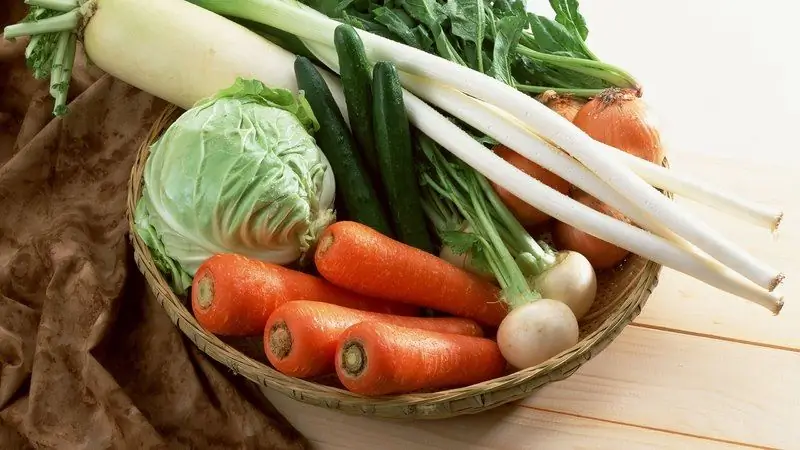
Alternating and mixing crops in the garden: good and bad neighbors, followers and predecessors for cabbage and carrots
